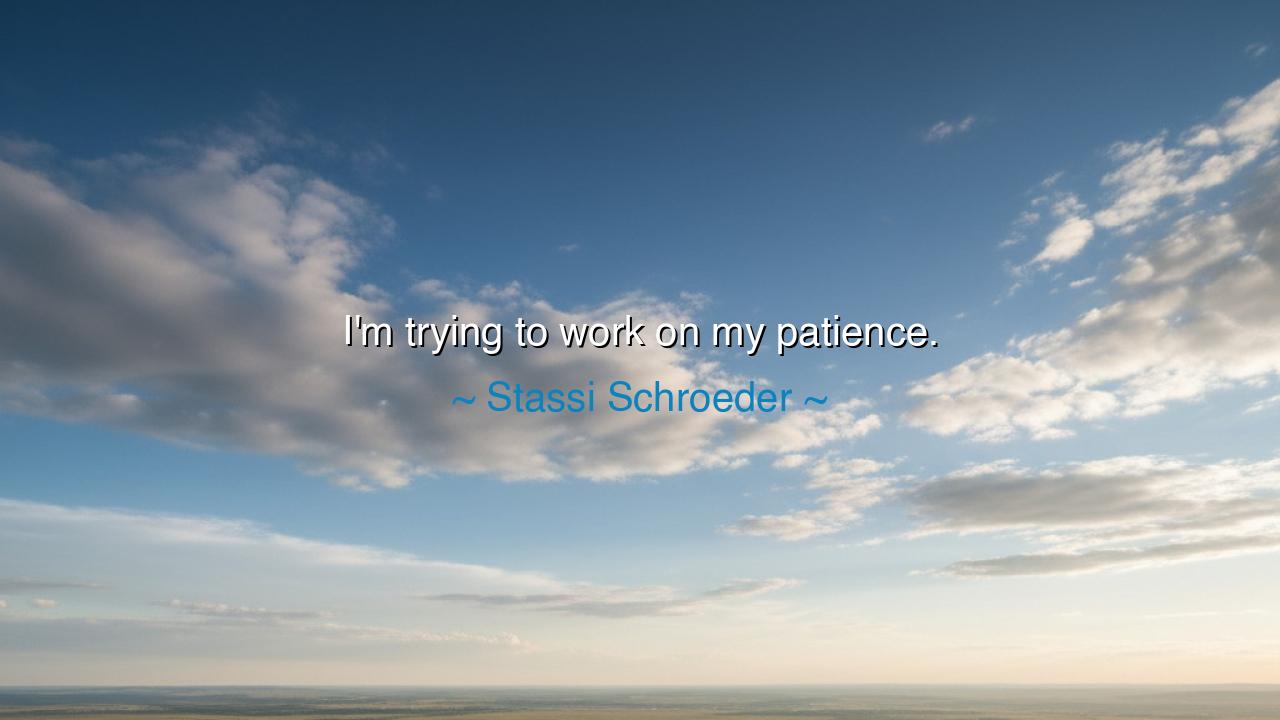
I'm trying to work on my patience.






Hear now the humble confession of Stassi Schroeder: “I’m trying to work on my patience.” Though the words are simple, they carry the weight of an eternal struggle. For what is patience but the quiet strength of the soul, the stillness that tempers fire, the discipline that allows time to ripen all things? To admit the need to cultivate it is not weakness, but wisdom, for it is the acknowledgment that human nature is restless, quick to anger, quick to demand, and often unwilling to wait for the unfolding of destiny.
In this brief statement lies the essence of the human journey. Every generation has wrestled with its temper, its desires, its urgency. To say, “I am working on my patience,” is to declare a battle against oneself, against the tyranny of impulse. It is an act of courage, for the fiercest enemies are not found in fields of war, but within the chambers of the heart. Schroeder’s words remind us that to be human is to strive for mastery over time and emotion, and that such mastery is never fully finished—it is always a work in progress.
History offers many mirrors for this struggle. Think of Marcus Aurelius, emperor of Rome, who, in his Meditations, constantly reminded himself to bear insult, delay, and hardship with calm endurance. He ruled over legions and provinces, yet his greatest concern was to rule himself. Or recall Gandhi, who, in the face of oppression, clung not to violence but to patience, knowing that change must be slow and steady like the carving of a river through stone. These examples show us that the pursuit of patience has ever been the mark of those who seek greatness.
Patience is not idleness, nor is it surrender. It is the discipline to wait with strength, to endure without breaking, and to act when the moment is ripe. Like a farmer who cannot rush the harvest, yet tends the field each day, so must we tend to our own growth. Schroeder’s declaration is an echo of this truth: that one must cultivate patience daily, through practice, through humility, through the acceptance that not all things can be controlled.
The lesson for us is clear: to live without patience is to live in chains—chained to anger, chained to disappointment, chained to the endless hunger of wanting everything now. But to live with patience is to live in freedom, for the patient soul is not tossed by every delay, nor shattered by every obstacle. It stands firm, waiting as the oak tree waits, growing deep roots while others scatter in the winds.
Practically, this means training oneself in small moments: waiting without complaint, listening without interruption, breathing before reacting. It means practicing gratitude for the present, even when the future feels distant. It means remembering that all worthy things—friendship, love, success, wisdom—are born slowly, and that impatience often destroys what might have been beautiful if only it had been allowed to ripen.
So let these words be both comfort and challenge: “I’m trying to work on my patience.” In them we see ourselves, striving daily to overcome the storms within. Let us take up this work as one of life’s greatest labors. For he who conquers impatience conquers not only himself, but also the chaos of the world. And in that conquest lies peace, strength, and the wisdom to walk steadily upon the long road of life.






AAdministratorAdministrator
Welcome, honored guests. Please leave a comment, we will respond soon